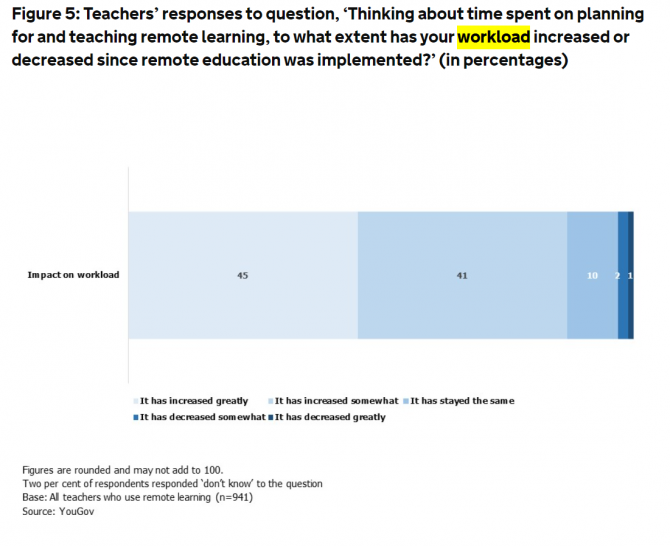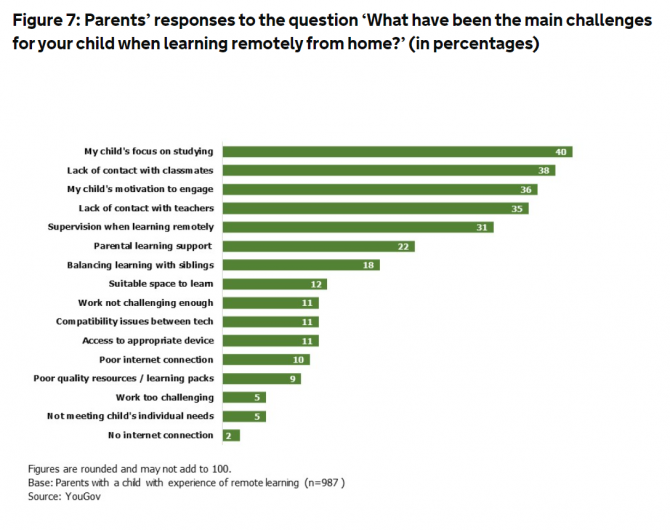Ofsted research has published a report into remote education following months of school visits and interviews with staff and parents.
These are main findings you need to know:
1. Switch to remote education has increased teachers’ workload
Ofsted found leaders “frequently cited” the workload burden that remote learning has placed upon teachers – with a common message that it has become “trickier during the autumn term”.
This was in part caused by the added pressure of providing learning in line with the curriculum for pupils both inside and outside the classroom – something Ofsted noted was a “particularly challenging situation”.
As such, pressures were not as great when whole year or class bubbles were sent home to self-isolate as teachers could revert to full remote education.
Eight-six per cent of teachers said their work has increased since the implementation of remote education – with 45 percent saying it had “increased greatly”.
2. Difficulty aligning curriculum with remote education
Only a small proportion of teachers – 15 per cent – reported their school had managed to ‘completely’ align their remote education solution to their intended curriculum.
Although a further 65 per cent said they had ‘somewhat’ aligned their remote learning with the curriculum, according to YouGov survey data.
But subjects such as art, science, physical education and design and technology were commonly cited as being the most problematic to teach remotely because of their practical aspects.
Ofsted found examples of schools being able to deliver “as full a curriculum offer as possible” by delivering arts supplies and musical equipment to pupils’ home, as well as using pre-recorded videos to demonstrate the practical lessons of science experiments.
3. A third of teachers not confident delivering remote lessons
Just over a third of teachers responding to the YouGov survey admitted they were not confident in teaching through remote methods.
However, around 48 per cent said they were quite confident, with 17 per cent classing themselves as very confident in delivering teaching this way.
Ofsted said shortening the length of lessons to aid pupils’ concentration spans was among the slightly different approaches teachers spoke of using when teaching remotely.
4. SEND children ‘more disengaged with learning’
The report also flagged worries over keeping pupils motivated, with 40 per cent of parents listing their child’s focus on studying as a main concern.
However, the survey found 59 per cent of parents of a pupil with special educational needs said that their child has been disengaged with remote learning.
Schools also raised concerns that learning gaps would be greater for pupils with SEND and the negative social and emotional impact the disruption caused by remote learning “would be more severe for some of these pupils”.
While some special schools have adapted their remote education to support SEND pupils, such as supplying assisted reading technology or arranging video calls with staff pupils have built a strong relationship with, more work needs to be done to engage children with send
Fewer than half (46 per cent) of the teachers surveyed stated that their school offered additional remote learning arrangements for pupils with SEND.
5. Feedback problems as teachers can’t see body language
School leaders said giving feedback to pupils was still a “developing area” within their remote learning provision.
They noted one problem was that picking up on pupil misconceptions in the learning process was not quite as immediate as in the classroom.
This was because even during live lessons teachers lack the ability to “to wander round and look at pupils’ faces in the classroom”.
This provides a barrier to the normal informal feedback provided by teachers as it is “more difficult to check whether pupils are confused from their expressions and body language.”
Some schools are attempting to circumvent this issue by providing 1-to-1 calls and interactive touch-screen questioning during live-lessons.
6. Schools went ‘out of their way’ to provide laptops
While access to digital devices was noted as an “initial barrier” faced by schools, especially for pupils from more disadvantaged backgrounds, Ofsted found that leaders went “out of their way to ensure that all pupils could access their digital platform”.
It found schools were pro-active in sourcing appropriate devices from the local community – working with local businesses and charities to acquire devices.
The schools watchdog also found some schools used their Covid-19 catch-up premium funding to purchase digital equipment.
But when asked for their main challenges about their children learning remotely, 11 per cent of parents listed both access to an appropriate device and issues with tech.
Data from Ofsted’s interim visits last term highlighted that “simply providing a device for all pupils is not necessarily a solution for access”.
For instance, one in ten parents also said poor internet connection was a major challenge.
7. Video lessons offer solution for shortage subjects and snow days
Schools said they believed a potential future benefit of remote education systems developed during the pandemic was to use video lessons “where there are subject specific teacher recruitment and retention issues”.
Video lessons were also put forward as a solution to covering staff absences with “video lessons from subject experts” providing cover instead of a usual substitute – such methods could also be used to support revision.
Leaders also said remote education could reduce potential lost learning during snow days or extended period of pupil absence.
The technology may also be employed going forward to support anxious or excluded students off site or in other on-site learning areas, leaders suggested.










Remote learning is an inovarive means to learning which can provide a modern advantage to learning. It would definately be a support alongside face to face learning. Teachers need to equip themselves to be able to deliver it successfully and then it could be seen as an added advantage to their skills. It could have been offered a long time ago. Anything new or different may seem scary yet innovation is key to new developments. Face to face has a big advantage and remote learning could be seen as a positive add on to supplement learning in many situations. Online learning is not a new concept and has been around for a while now but not explored enough by schools. Being part of a modern world has maybe forced the hand of education and it could be viewed positively when people can see the advantages.
It can also be used for children who are home schooled, this type of learning could be seen as a mode of learning with a lot of advantages if delivered correctly and less resistance to change. Face to face learning will always be the fundamental building blocks to learning and there are definately more advantages yet online learning can be just as good in the short term as well as in specific situations. It’s time to move forward and skill teachers up to an ever changing world. It is good for chellenges in life its just an awful way to learn about it through the covid situation. When there is time to reflect it would be hopeful to think that something good comes out of online learning.
As far as developing social skills are concerned online learning would have to be explored further and yet again another way of looking at the situation. Meeting and playing with peers will probably be the best way to learn but now it’s time to keep exploring and then evaluate fully. You have a large audience at the moment and what better way to research findings.
Above education must come health, as no point in educating if people go on to die, whether it be teachers, admin, kitchen staff, caretakers, cleaners or the SCHOOL TRANSPORT STAFF, DRIVERS & PASSENGER ASSISTANTS, ALL THESE PERSONELL NEED TO BE COVERED AS WELL AS TEACHING STAFF AS THEY MEET MUTIPLE NUMBERS OF CHILDREN EVERYDAY ALSO IN THEIR WORK.
100% agreed
With regards to the first point, (providing learning in line with the curriculum for pupils both inside and outside the classroom). Shouldn’t the lessons be identical in terms of content and how its delivered?
In my opinion i personally can’t see this as an issue.
Chris,
The point was made that certain subjects such as art, science and other subjects requiring a practical hands on approach are difficult to teach online. It’s not just a case of switching the curriculum content online, there are many hurdles to jump before remote learning is on par with classroom learning…
I’m not sure that many children will have chemicals, glassware and Bunsen burners to do chemistry experiments so how on earth could my lessons be identical at home?
Modern teaching involves a lot of interaction and a wide variety of methods of delivery some of which simply cannot be replicated online. If we compare to the old days of lectures, note taking and work sheets then yes very transferable to online but relying on those methods only is not good practice.
Without doubt we have developed new and exciting skills which is a benefit of the situation and these skills will be used positively in the future for a number of situations. As an executive lead I probably should not say this however I am.
When and if we get a snow day in Cornwall the only remote learning my schools will be setting will be to go out and have fun, build a snowman, create snow angels, have a snow ball fight, but please create a risk assessment first !